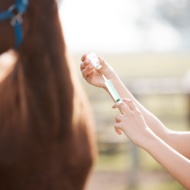Young camels spread coronavirus to humans, study finds
MERS-CoV causes only mild symptoms in camels, but can be fatal to humans.
A study has found that young camels present a high risk for human exposure to MERS-CoV, which causes Middle East respiratory syndrome.
Research from the Royal Veterinary College (RVC) discovered that the kissing and petting of young camels in the Middle East increased the spread of the zoonotic disease.
MERS-CoV is a respiratory virus that affects both humans and camels. Like SARS-CoV-2, it is part of a group of deadly zoonotic beta-coronaviruses.
While it causes only minor cold and flu symptoms in camels, it can be fatal for humans. So far there have been more than 2,600 human cases reported, with 940 deaths reported across 27 countries.
However, despite this high fatality rate, the connection between zoonotic transmission pathways and camel subpopulations is poorly understood.
Researchers from the RVC conducted a cross-sectional study among livestock-owning households in southern Jordan. A random selection of households was selected, where researchers interviewed and medically examined 879 people.
This included taking nasal and oral swabs, blood samples and blood pressure readings.
Young camels were already known to shed high volumes of the virus when they are infected. The study revealed that, because their muzzles are at human head height, activities such as feeding and watering were contributing to a higher risk of infection.
The kissing and petting of camels is common among camel-owning communities in the Middle East, which value camels highly above other livestock. Camel races provided another high-risk environment for infection.
The study also demonstrated occurrences of human-human transmission in family household settings, with members without camel contact showing evidence of infection if they lived with someone who had tested positive.
Diabetic household members were at particular risk of infection.
Researchers say that these findings highlight the importance of virus surveillance across the Arabian Peninsula and help identify which communities should be prioritised once a vaccine becomes available.
Javier Guitian, professor of veterinary public health at the RVC, said: “This study represents one of the largest epidemiological investigations of MERS-CoV among high-risk populations since the virus was first identified in Saudi Arabia in 2012. Our findings highlight the role of contact with juvenile dromedary camels and attendance at camel races in zoonotic transmission.
“Additionally, we provide evidence in support of within-household transmission among camel-owning communities. Effective surveillance among these high-risk groups remains a global health priority.”
The full study can be found in the journal The Lancet Microbe.
Image © Shutterstock



 Zoetis UK has apologised for a supply shortage of Equip Artervac, caused by a manufacturing issue.
Zoetis UK has apologised for a supply shortage of Equip Artervac, caused by a manufacturing issue.